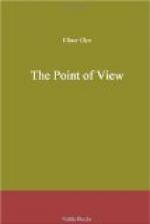Mr. Medlicott was now silent, almost choking with perturbation. So Count Roumovski went on:
“The wise man faces the facts of nature. Looks straight to find God’s meaning in them, and then tries to exalt and ennoble them to their loftiest good. He does not, in his puny impotence, quarrel with the all-powerful Creator and try to stamp out that with which He thought fit to endow human beings.”
“Your words convey a flagrant denial of original sin, and I cannot listen to such an argument,” Mr. Medlicott flashed, his anger now at white heat. “You would do away with a whole principle of the Christian religion.”
“No; I would only do away with a faulty interpretation which man grafted upon it,” Count Roumovski answered.
Then the two men glared straight into each other’s eyes for a moment, and Eustace Medlicott quailed beneath the magnetic force of the Russian’s blue ones—he turned away abruptly. He was too intolerant of character and too disturbed now to permit himself to hear more of these reasonings. He could but resort to protest and let his wrath rise to assist him.
“It cannot benefit either Miss Rawson or ourselves to continue this unseemly controversy over her,” he said in a raucous voice. “I have told you I will give no freedom upon your request—and I have warned you of my action. Now I shall go,” and he took three steps toward the door.
But Count Roumovski’s next words arrested him a moment; his tone was no longer one of suave, detached calmness, but sharp and decisive, and his bearing was instinct with strength and determination.
“Since we are coming to warnings,” he said, “we drop the velvet glove. The discourtesy to a lady conveyed in your words obliges me to use my own way without further consulting you for assisting her wishes. I will again thank you for coming up here and will have the honor to wish you goodnight.” With which he opened the door politely and bowed his visitor out.
And when he was alone Count Roumovski sat down by the open window and puffed his cigar meditatively for some minutes, smiling quietly to himself as he mused:
“Poor, stupid fellow! If people could only be honest enough with themselves to have a sensible point of view! It is all so simple if they would get down to the reason of things without all this false sentiment. Of what use to chain the body of a woman to one man if her spirit is with another? Of what use to talk of offended honor with high-sounding words when, if one were truthful, one would own it was offended vanity? Of what use for this narrow, foolish clergyman to protest and bombast and rave, underneath he is actuated by mostly human motives in his desire to marry my Stella? When will the world learn to be natural and see the truth? Love of the soul is the divine part of the business, but it cannot exist without love of the body. As well ask a man to live upon bread without water.”




